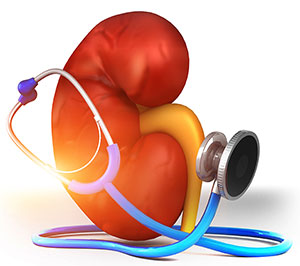 What is Chronic Kidney Disease Stage 3?
What is Chronic Kidney Disease Stage 3?
Chronic kidney disease (CKD) occurs when the kidneys have been damaged. Kidneys are important. They filter out waste and extra fluids from the blood, help make red blood cells and keep bones strong.When the kidneys are not working well, waste builds up in the blood.
A health provider tests your blood and urine to calculate the glomerular filtration rate (GFR), which is a measure of how well the kidneys are working. Based on the results of these two tests, your GFR is calculated. In chronic kidney disease stage 3 there is a moderate decrease in the glomerular filtration rate (GFR), resulting in a GFR between 30 and 59. Finding out about kidney disease early and making lifestyle changes can help maintain kidney function for a longer time.
People who have diabetes or high blood pressure are at a higher risk for chronic kidney disease, but the kidneys can also get damaged in other ways. Everyone’s GFR gets lower with age, even in people without kidney disease.
You should speak to your primary care provider if you have any questions about the health of your kidneys or any stage of chronic kidney disease. You can slow the progression of chronic kidney disease by becoming your own health care advocate.
Take Charge of Your Health
Working with a primary care provider
- Questions to ask your primary care provider:
- Can I make an appointment with a kidney doctor? Will I need a referral?
- Can I make an appointment with a renal dietitian? Will I need a referral?
- To find a Registered Dietitian, visit the National Kidney Foundation’s Council of Renal Nutrition’s CKD Dietitian Directory OR
- The Academy of Nutrition and Dietetics’ Find an Expert page
- Explain what my lab results mean. Is there anything I can do to improve these values?
- Finding a primary care provider if you do not have one
- Visit the Health Resources and Services Administration website to find a Federally Qualified Health Center
- Call 211. This number helps connect callers with a variety of resources including health resources
- Call Provider Services at 800-947-9627 and ask about eligibility requirements. The Wisconsin Chronic Disease Program (WCDP) has financial assistance to dialysis patients for medications and other kidney -related treatments.
- Check what your insurance will cover
- Questions to ask:
- What types of visits are covered (doctor, dietitian, etc.)
- How many visits are covered annually (as a number of hours or as a number of visits)
- If you have private insurance, call the 1-800 number on the back of your insurance card and speak to the claim’s department’s “case manager” or “care manager”. While not every insurer has a “case manager” or “care manager”, every insurer would be able to provide you with information on what services would be covered before you visit a medical professional.
- If you have Medicare or Medicaid, call a benefits specialist in the county where you live to ask questions about your benefits.
- Or call the Medigap/SHIP Helpline at 1-800-242-1060 with questions about Medicare supplemental insurance, Medigap policies or other health insurance. It does not matter how old you are or whether you currently have insurance or not.
Take steps to protect your kidney function
- Fill your prescriptions and take medications as prescribed
- Work with your health care provider to monitor blood pressure and cholesterol
- If you have diabetes, keep your blood sugar as close to normal as possible. If you are diabetic, fill and take all prescribed medication
- Ask the pharmacist at the grocery or drug store for help anytime you are choosing an over the counter medication, vitamin or supplement. Pharmacists can help decide if these items are safe for those with chronic kidney disease
- Stop smoking and using tobacco related products. A FREE quit coach can help. Call 1-800-QUITNOW or visit https://ctri.wisc.edu/quit-line/
Make good food choices to help your kidneys
- Explore the various articles available in the National Kidney Foundation’s A to Z Health Guide – Diet, Nutrition & Exercise
- Read Eating Right for Chronic Kidney Disease from the National Institute of Diabetes and Digestive and Kidney Diseases (NIDDK)
- Learn about the differing nutritional needs during the various stages of Chronic Kidney Disease on the National Kidney Foundation’s web page Nutrition and Kidney Disease, Stages 1 – 4
- Discover what you need to be aware of on food labels in How to Read a Food Label when you have chronic kidney disease
More Information
Additional information about CKD and other kidney health topics can be accessed from the
National Kidney Foundation’s Topic Brochures page. Click here to be directed to the National
site.
You are the most important person on your care team. It is always okay to have questions and ask your health care provider as your needs change along the way. You can also call the National Kidney Foundation of Wisconsin help line at 414-897-8669 (1-800-543-6393 toll free) or email info@kidneywi.org. The team is here to help you.
Financial Assistance
Wisconsin Chronic Disease Program (WCDP)
The Wisconsin Chronic Disease Program (WCDP) offers Wisconsin dialysis patients and kidney transplant recipients a safety net of coverage for medications and other kidney-related treatments.
Dialysis or transplant social workers at any of Wisconsin’s units or transplant facilities can assist patients/recipients.
If you need immediate assistance, please call Provider Services at 1-800-947-9627 (enrollment/eligibility questions) or Member Services at 1-800-362-3002 (claims or reimbursement questions).
MediGap Helpline
Toll-Free: 1-800-242-1060
The Medigap Helpline Services is a free, confidential counseling service that is part of the Board on Aging & Long Term Care. The HELPLINE provides information and assistance in understanding Medicare, and the various types of insurance that surrounds Medicare, to help each individual understand their coverage and what might be more beneficial to each individual. The HELPLINE staff can answer questions about Medicare, Medicare Supplements, Medicare Advantage plans, and Prescription Drug Coverage. Staff can also review employer sponsored insurance. There is no connection with any insurance company.
Insurance Assistance
For hands-on assistance with Medicare enrollment, benefit applications or appeals, contact your local Aging and Disability Resource Center (ADRC) or Aging Unit to speak with a benefit specialist.
To file a complaint about a specific insurance company or agency, contact the Wisconsin Office of the Commissioner of Insurance at 1-800-236-8517





